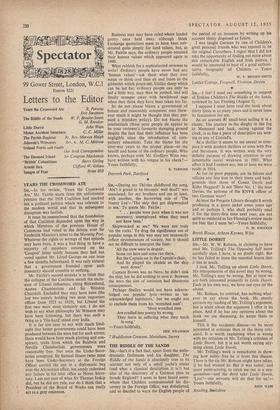Letters to the Editor
Years the Crossword Ate R. Parsons Eric Swainson The Riddle of the Sands W. P. Brooke-Smith G. M. Knocker Little Dorrit John Wain
Motor Accident Insurance C. C. Miller
The Parish Register Rt. Rev. Mervyn Haigh Jehovah's Witnesses Rev. K. M. C. Melrose Ireland North and South Ow Irish Correspondent
The Doomed Island Sir Campton Mackenzie
`British' Columbians Barry Girling Arnold Bax Clifford W. Gillam Images of Fear Brian Hill YEARS THE CROSSWORD ATE
SIR,—In his review, 'Years the Crossword Ate,' Mr. Fairlie starts from the unfortunate premise that the 1918 Coalition had marked out a political pattern which was relevant to the modem world and that its subsequent disruption was foolish.
It must be remembered that the foundation of that Coalition depended upon the way in which Members of the previous House of Commons had voted in the debate over Sir Frederick Maurice's letter to the Morning Post. Whatever the rights or wrongs of that episode may have been, it was a bad thing to have a majority of members returned on the `Coupon' letter solely because they had not voted against Mr. Lloyd George on one issue a few months beforehand. It was only natural that a government founded upon such insecurity should crumble to nothing.
Mr. Fairlie's second mistake is to think that the collapse of the Coalition meant the exclu- sion of Liberal influences, citing Birkenhead, Austen Chamberlain and Sir Winston Churchill. Excluded they may have been (the last two merely holding two most important offices from 1925 to 1929), but Liberal the first two were most certainly not. I do not wish to say what philosophy Sir Winston may have been following, but there was such a thing as a 'Die-hard' stand over India. It is far too easy to say with much hind- sight that better governments could have been produced between the wars but for such errors; there would have been much plotting and con- spiracy, traits from which the Baldwin and Neville Chamberlain governments were reasonably free. Not even the Under-Secre- taries conspired. Sir Samuel Hoare (who must have been Under-Secretary at the Foreign Office) carried the can in a diplomatic bag over the Abyssinian affair, but amply redeemed any failure in his later office as Home Secre- tary. I am not sure of what Sir Thomas Inskip did, but he did not rule, nor do I think that a President of the Board of Warks can really act as a grey eminence.
Business men may have ruled where landed gentry once held sway although Stock Exchange quotations seem to have been sub- stituted quite simply for land values, but, as Mr. Fairlie says, the ordinary people retained their human values which appeared again in I 940.
What rubbish for a sophisticated reviewer to write! Ordinary people have never had any 'human values'—ask them what they ever mean or think and then sit and listen to the gibberish which pours out. Unlike sheep which can be led far, ordinary people can only be led a little way, may then be pushed, and will finally scamper away with bewildered rage when they think they have been taken too far.
So do not please blame a government of honest and reasonably competent men (how- ever much it might be thought that they pur- sued a mistaken policy). Do not blame the intellectuals (these poor people do appear to be your reviewer's favourite stamping ground despite the fact that their influence has been negligible since the introduction of com- pulsory education). Take the blame for the inter-war years to the proper place—to the hearth and home of the ordinary people. Who knows, perhaps even Mr. Godfrey Winn may have written with his tongue in his cheek?— Yours faithfully,
R. PARSONS Darenth Park, Dartford


































 Previous page
Previous page